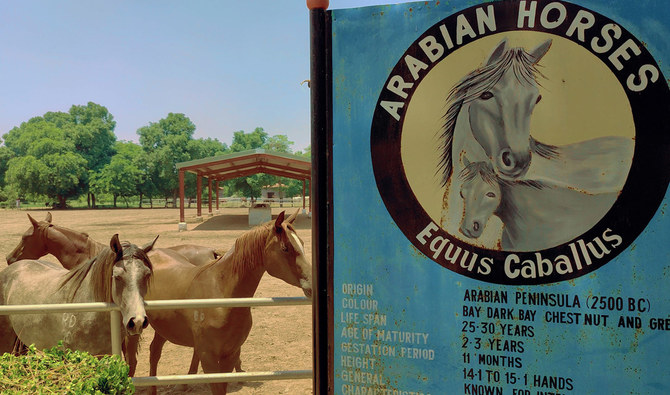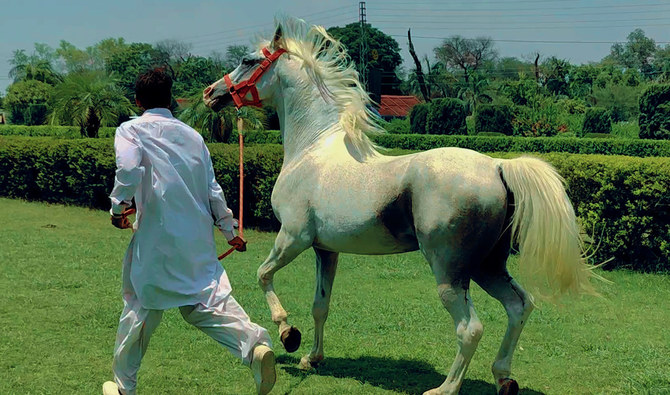MONA: With its long, arched neck, refined wedge-shaped head and high tail carriage, the Arabian is one of the most easily recognizable horse breeds in the world.
It is also one of the most ancient, with archaeological evidence available of horses in the Middle East that resemble modern Arabians dating back over 4,500 years.
In Pakistan, over 600 Arabians can be found at the Remount Depot Mona military facility located in Mandi Bahauddin, with the animals specially trained for equestrian games and dressage events.
Founded in 1902, the depot is spread over 10,000 hectares of land, complete with roads, buildings, a canal and a train line, and serves as a hub for breeding and nurturing horses, donkeys and mules.
Pakistan started importing Arabian horses almost 70 years ago, often placing them in competitions as prized show animals and keeping a pool as gifts for foreign dignitaries.
“Pakistan has 808 Arab horses, which are registered with the World Arabian Horse Organization, of which 627 animals are from the Remount Depot Mona while only 181 are from all over the country,” Brig. Mohammed Naeem, the commandant of the depot, told Arab News during a visit to the facility last week.
WAHO, founded in 1970, is a UK-based charity with 82 affiliated countries that works to preserve pure Arabian bloodlines, promote breeding knowledge globally, coordinate member clubs, establish uniformity in breed terminology, and consult on other Arabian horse-related matters.
But what makes the Arabian horse so special?
“Among known breeds of horses, the most ancient breed is the Arabian horse, which originated around 2,500 B.C. from the Arab Peninsula,” Naeem said, adding that the animals were renowned for their “exceptional beauty,” particularly when they ran and raised their tails, showing off their “elegant form.”
Even though the precise origins of the Arabian are unknown, the breed is thought to have originated on the northern edge of the Syrian desert.
“They are widely recognized as one of the most famous horse breeds in the world,” Naeem added.
Pakistan became a member of WAHO in 1997, with Mona Remount Depot its sole representative in the country. While horse breeding at the depot began as a passion in 1956, the depot successfully turned to science in 2021 when it launched a test tube program.
“At our facility, we have successfully witnessed the birth of 15 test tube babies thus far, with an additional 12 pregnancies currently ongoing,” Naeem said.
The first Arab horse at the depot was imported in 1955 from the US and 31 others after that from different countries.
“The price of an imported Arabian horse varies from $5,000 to $50,000, depending on the quality and pedigree of the animal,” Naeem said.
“The expenses for importing also vary depending on the country of origin and whether the animal is transported in a single cage or a group cage. From Gulf states, it costs around $10,000, while from Western countries and the US, it can cost up to $20,000.”
At the depot, the brigadier said, the cost of breeding, raising, and training an Arabian was “significantly lower due to locally produced fodder and other factors.”
Naeem explained: “The budget of the depot is provided by the Ministry of Defense.”
A pool of Arab horses, the brigadier said, was also kept to be presented as gifts by the Pakistani government and army to visiting dignitaries.
“Thirty-six animals have been presented to different heads of state, including of Saudi Arabia, the UAE, Qatar, Bangladesh, Sri Lanka, and other countries,” Naeem said.
The rulers of Jordan, Qatar, and Saudi Arabia had gifted horses to Pakistani rulers also at different points over the last decades.
“King Faisal gifted an Arabian horse to Gen. Mohammed Zia ul Haq,” he said, referring to the Pakistani military officer, who was the sixth president of Pakistan, “and the Saudi king also gifted a horse to Gen. Pervez Musharraf,” he said. Musharraf was the 10th president of Pakistan.
Horses given as gifts to Pakistani rulers were always kept at the depot, Naeem said.
According to experts, the Arabian is classified as a “hot-blooded” breed, with its sensitivity and intelligence enabling quick learning and greater communication with riders. This is why the breed is trained for equestrian games such as riding, dressage, polo, and tent pegging.
“We have horses specifically trained for show jumping and vaulting, which are used for various functions,” Naeem said.
One of the depot’s Arabian horses won the best polo pony prize in Pakistan six times, the brigadier added.
“These horses are highly responsive animals,” said Mohammed Rasaldar, a trainer at the facility who runs daily training sessions with the animals that start at 6 a.m. and continue through the day. “The more love and attention they receive, the more attached and responsive they become.
“We have a 39-week-long training course for them, during which we expose them to various environments to eliminate their fears…They also receive training for different games throughout this course.”
Mohammed Akhtar, who trains the horses for polo, said the animals respond to every command.
“A horse is a very powerful animal,” he said, “and man can control it only by training it with a lot of love and compassion.”






























